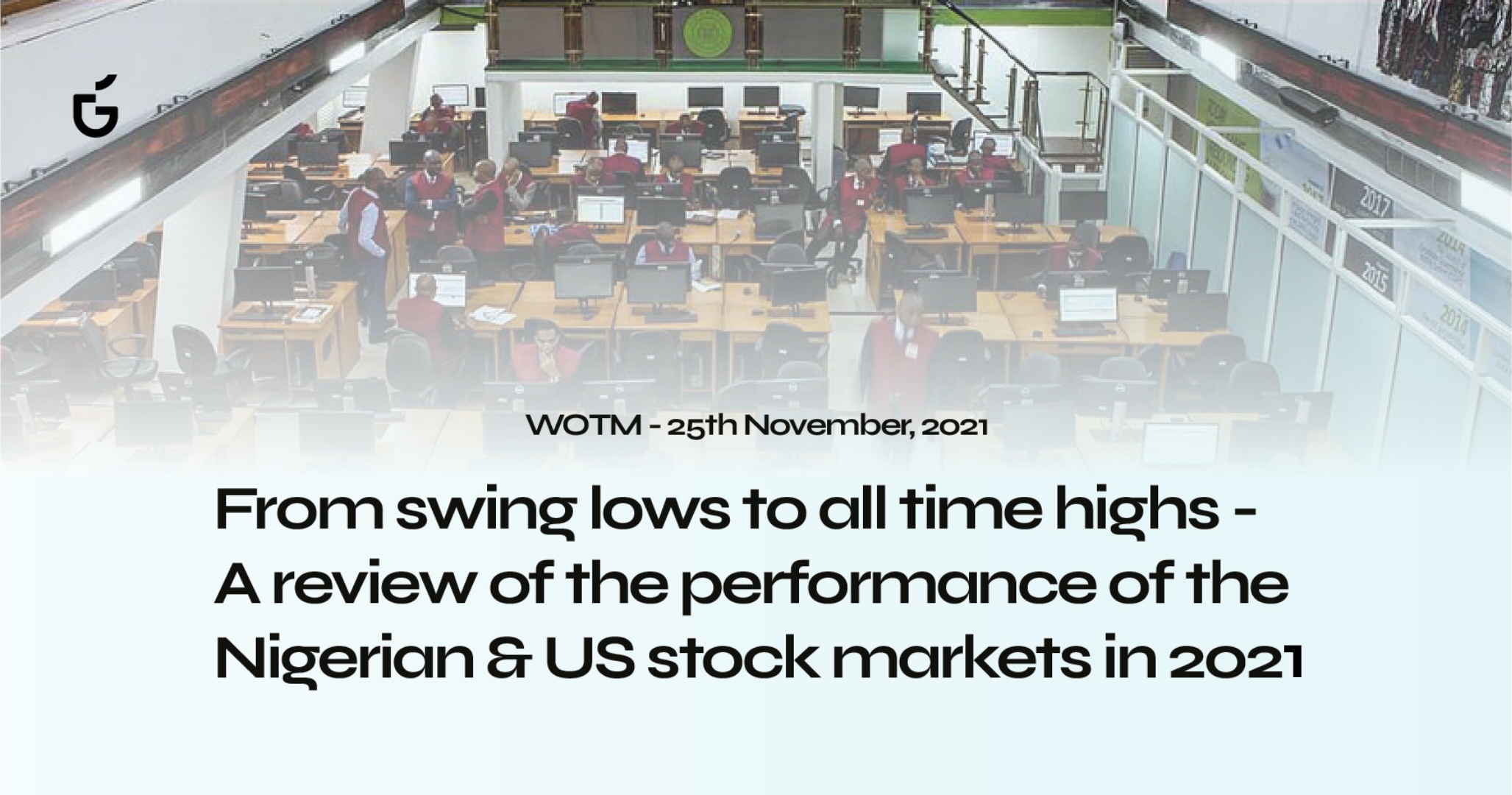 Africa
AfricaUnderstanding how companies are valued – A look into the MainOne acquisition
15 December, 2021
11 August, 2021 | 4 MINS READ
Start-Up Valuations
The Story
Investors on the 1st of August 2021, woke up to the news of Square (a digital payment company owned by Jack Dorsey) acquiring Australia’s popular Buy Now Pay Later (BNPL) company Afterpay for $29bn. This acquisition is an all-stock transaction. 1% of the payment can be done in cash and the rest in stocks, giving Afterpay’s shareholders the opportunity to own 0.375 shares of Square for every Afterpay share they own.
This announcement led to an immediate 14% rise in Square’s share price from $247.26 to $272.38 and a 19% increase in Afterpay’s share price moving from $96.66 to $114.80.
A little more on the Acquisition
This $29bn acquisition is the biggest buyout in Australia’s corporate history and according to Motley Fool, this represents 42times Afterpay’s 12-month trailing revenue (revenue in the last 12 months) and 31% premium to Afterpay’s closing price prior to the announcement of the deal.
Although this deal is seen as being overpriced, analysts agree that the buyout is beneficial to both companies. Square owns Cash App, a mobile app that allows users to transfer money with ease. The app is in use in the US and The UK and as of the 31st of March 2021, it had 36million active users.
Afterpay on the other hand is a Buy Now Pay Later (BNPL) app that allows users to shop for items and pay in 4 installments, interest-free. It has over 16 million users with nearly 100,000 merchants. Besides its BNPL feature, it also serves as an e-commerce hub/digital mall where buyers and sellers can transact. The restrictions and economic woes that came with the pandemic increased the use and value of Afterpay.
Though the price for Afterpay seems hefty, the synergies are glaring. This acquisition gives Cash app the opportunity to expand across the globe. At the moment, 85% of its payment volume is from the US, with Afterpay, Square would be able to push Cash app and its other business solutions outside the US & UK. Afterpay would also be integrated into Cash app for existing users to take advantage of. The BNPL feature would drive increased use of cash app given its customer demography of young users and the preference of this demography for BNPL over traditional credit.
Some Interesting Start-up Acquisitions and how they are faring now
Back in February 2018, Amazon acquired the smart doorbell company Ring for $1billion, Ring had formerly been rejected on Shark Tank (the popular business reality show). Amazon bought Ring for an opportunity to enter the home security and devices market and increase the use of its voice assistant Alexa. Alexa was integrated into the video doorbell, allowing users to control their video doorbell with voice. Recently, Ring has come under fire for privacy and security issues, also for sharing doorbell footage with law enforcement. This notwithstanding, Ring remains a force to reckon with in the home security space. According to Businesswire, Ring is a leader in the global home security camera market. It doubled its market share in 2020 and remains on the list of the top 10 best home security devices.
Salesforce also acquired Slack last December; which was one of the biggest acquisitions of 2020. The acquisition was billed $27.7bn. This acquisition seems beneficial to Slack, who is struggling with profitability, and competing favorably with videoconferencing apps like Microsoft Teams and Zoom. Its share price had dipped 40% between the time it was listed in 2019 and the acquisition. The company projected $855 million as revenue in 2021 and an operating loss of $100 million. This is despite the fact that the company has grown its paying users from 130,000 as at end of 2020 to 3 million in 2021.
Bringing it Home, Venture Capital Investing in Nigeria
‘Fund Raise’ has become a popular term in the Nigerian digital space. Stripe’s $200mn acquisition of Paystack and Flutterwave becoming a unicorn are some of the highlights of venture capital investing in Nigeria.
Last week, Kuda Bank, a digital bank based in London, but operating in Nigeria was reported to be valued at $500 million. The bank raised $25 million in early 2021 and another $55 million recently. This valuation positions Kuda Bank as the 7th most valuable bank in Nigeria.
The announcement of this valuation stirred up conversations around whether start-ups and tech companies are valued rightly. To shed light on valuation, let’s dig a little into how tech/digital start-ups are valued.
Valuation is basically the process of determining the worth of a business. How a business is valued depends on the industry the business operates in. Before the advent of tech start-ups, companies were valued based on generated revenue or expected cashflow. The new companies emerging in this digital age are different, they are pioneers in their industries, either offering products that have did not exist before now or radically changing the way existing products are produced and used. How do you value them? Their cashflows are a little hard to project and their revenues are unstable.
Digital/tech start-ups are valued based on the number of active subscribers and the uniqueness of the technology driving the company’s product. These factors are usually given a weighting when determining the value of a business. The weights given to each factor is however determined by the possible synergies from an acquisition, market sentiment, and the ability of the owner of the business to show the future growth potentials of the business. This explains why Salesforce will acquire Slack at $27.7bn even though Slack is loss-making.
To narrow it down, let’s look into how Neobanks (digital banks like Kuda) are valued. Neobanks are popular for having elevated valuations. Investors around the world value Neobanks based on customer acquisition and the authenticity of the technology driving the bank’s operation.
According to Finovate (a financial content digitalization platform), Neobanks customer acquisition cost per customer ranges between $1 – $38 compared to $200 for traditional banks. Accenture also carried out research showing Neobanks runs at a significantly lower cost than traditional banks. The operating cost per customer of digital banks in the UK ranges between $25 – $63 compared to $210 for traditional banks. All of these filters into their valuation.
How Investors Should Think About VC Investing
Venture Capital Investing is basically about providing financing for start-ups and small companies that are thought to have exponential growth potentials. It is mostly done by High Networth Individuals (HNIs) and institutional investors. This asset class has the risk of massive losses but also holds the potential of producing incredible profits.
Investors looking to start venture capital investing should consider investing through credible and successful venture capital funds. Venture capital funds deal directly with start-ups and have the capacity to monitor how start-ups operate. More importantly, venture capital funds have a portfolio of start-ups they invest in. This helps mitigate the risk that comes with venture capital investing as the profits from one start-up can cover the losses from two other start-ups in the same portfolio.
September is VC month for members of TGIC, we’ll be partnering with Venture Platforms for our next VC fund raise.
Interested in joining TGIC? Get on the waitlist to be notified when the club opens to new members.
 Africa
Africa15 December, 2021
 Africa
Africa09 December, 2021
Join the biggest
investment club in Nigeria.